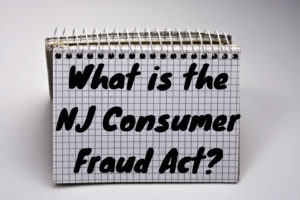By: Robert J. Nahoum
THE PROBLEM:
Every day in American consumers fall victim to unscrupulous business practices. The fraudsters are indiscriminate and will rip off whomever they can in any way they can. The scams cover a wide variety of business endeavors including construction, car sales, and finance and debt collection. There are federal consumer protection laws intended to protect consumers including
- The Fair Debt Collection Practices Act (FDCPA, relating to the debt collection industry);
- The Fair Credit Report Act (FCRA, relating to credit reports);
- The Truth In Lending Act (TILA, relating to lending like mortgages and care loans);
- The Magnuson-Moss Warranty Act (MMWA, relating to warranties of products);
- The Real Estate Settlement Procedures Act (RESPA, relating to real estate sales);
However, there are countless business scams that are not covered by these federal consumer protection laws. So if you are the victim of an unscrupulous business that is not covered by a federal consumer protection law, is there a law that does protect you?
THE RULE:
Most states have what is generally called an Unfair, Deceptive Acts and Practices law (or UDAP for short). The strength of the protections varies from state-to-state. New Jersey’s UDAP law, called the New Jersey Consumer Fraud Act, is particularly strong.
The New Jersey Consumer Fraud Act defines consumer fraud as “any unconscionable commercial practice, deception, fraud, false pretense, false promise or misrepresentation†in connection with the sale of goods, services or real estate. Under the definition, the term “saleâ€, does not require that the transaction be completes as it also includes “offers†and “attempts†to sell, rent or distribute goods or services.
Under the New Jersey Consumer Fraud Act a consumer fraud may be committed by an (1) affirmative misrepresentation; (2) a knowing omission; or (3) a violation of specific consumer protection.
An affirmative misrepresentation fraud is committed when the person or business makes a statement that turns out to be untrue regardless of whether the person or business making the statement knew that it was untrue at the time it is made.
A knowing omission consumer fraud is committed when the person or business knowingly conceals, suppresses or omits a material fact. A fact is material if it is important to the transaction.
The final category of consumer fraud covers a wide variety of commercial endeavors with specific laws enacted to cover each one. The most common practices where frauds are alleged include, home improvement contracts, gym memberships and auto sales.
Alleging a violation of the New Jersey Consumer Fraud Act is the first requirement in making out a claim. Next, the consumer must establish that he of she has suffered an “ascertainable loss†related to the act of consumer fraud. In order to be considered an “ascertainable lossâ€, the damage suffered by the consumer calculable.
If a consumer is able to successfully sue for a New Jersey Consumer Fraud Act claim, he or she is entitled to three times the amount of damages suffered (called treble damages).
The New Jersey Consumer Fraud Act is “fee shifting†meaning that if the consumer is successful in his or her lawsuit; the offending business must pay the consumer’s reasonable attorneys’ fees. Because these laws are fee shifting, most consumer attorneys will handle a consumer protection case without ever charging the consumer a penny.
WHAT YOU SHOULD DO:
If you’ve been victimized by an unscrupulous business, seek out and find a qualified consumer attorney. Due to the fee shifting nature of The New Jersey Consumer Fraud Act, you may not have to pay any attorneys’ fees out of pocket to protect your rights as a consumer.
If you need help, contact us today to see what we can do for you.
If you need help with a consumer protection issue, contact us today to see what we can do for you. With office located in the Bronx, Brooklyn and Rockland County, the Law Offices of Robert J. Nahoum protect consumers throughout New Jersey and New York.
The Law Offices of Robert J. Nahoum, P.C
Phone: (845) 232-0202
email: info@nahoumlaw.com
Web:
www.nahoumlaw.com
www.BronxDebtDefense.com
www.BrooklynDebtDefense.com
www.NYDebtDefense.com
www.NJDebtDefense.com

